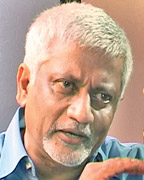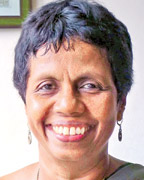|
Women and minor parties representation absolute
pre-requisite:
De-limitation hits a snag
By Anuradha Kodagoda
De-limitation - the crux of the electoral process has hit a snag with
the Elections Commissioner saying that it could be completed in 90 days
while the Additional Commissioner of Elections and former Director
General of Registration of Persons vehemently saying it was out of the
question and could not even be completed in the hundred day program
Ninety days
"Although the Election Commissioner Mahinda Deshapriya said recently
that delimitation can be done within 90 days, according to the
feasibility analysis, delimitation is not possible within the 100-day
program," so said H.G. Dharmadasa, former Additional Commissioner of
Elections and former Director General of Registration of Persons.
Speaking at the discussion 'how can the 100-day program promise to
reform the electoral system to be implemented?', held at the SLFI
recently, H.D. Dharmadasa said, "Although President Maithripala Sirisena
has promised in his manifesto that delimitation could be done within the
100-day program, the thing is to make this a reality before the next
dissolution of Parliament, where we have time till next April in 2016.
However, taking the latest technological facilities and
gearing up of the provincial and district administration and also
that of the Survey Generals Department, we do not have to wait till the
next dissolution of Parliament in 2016 to implement the electoral
system,"
The discussion was held using a comparative analysis of three
variants of the recommendation of the Parliamentary Select Committee (PSC)
chaired by former Minister Dinesh Gunawardene, Professor Rohan
Samarajiva and Dr. Sujata Gamage based on simulations of the results of
the past four General Elections.
Out of three variants that Prof Rohan Samarajeewa and Dr. Sujata
Gamage explained, 60:40 (First Past the Post: Proportional
Representation) ratio that they identified as the closest to the PSC
recommendation, with some adjustments to accommodate small-party and
other concerns.
Speaking at the discussion Prof. Rohan Samarajeewa said, "In this
ratio 140 MPs were elected first-past-the-post (FPP) in 140 newly
delimited electorates; 70 MPs are elected through Proportional
Representation (PR) applied to remainder votes at the district level;
and 25 are appointed through the National List as at present, giving a
total of 235 MPs in Parliament.
 |
"60:40 (First Past the Post:
Proportional Representation) ratio that they identified as the
closest to the
PSC recommendation"
|
 |
| Prof Rohan
Samarajiva |
Dr. Sujata
Gamage |
This solution results in 60 percent of the seats in Parliament being
decided on the FPP method; 30 percent by remainder-based PR and
approximately 10 percent by PR applied to total votes gained. This
yields a 60:40 (FPP: PR) ratio.
The meeting that we had recently with Elections Commissioner, Mahinda
Deshapriya and leaders of political parties, this is the ratio that has
been agreed upon and open for further discussions,"
Topical and timely
Several important proposals surfaced which were topical and timely
for reconciliation. Small political parties must be given a fair
opportunity in any reform.
Sri Lanka has small political parties with geographical strongholds
such as the TNA/ITAK and those whose support is geographically spread
out such as the JVP. Naturally these forces must be given a reasonable
chance when the final draft on the new electorates are made. Concern has
also been expressed about the stability of future governments that will
be formed, especially in the light of the weakening of the executive
presidency. This is an important consideration.A successful solution
would also include measures to remedy Sri Lanka's woeful
under-performance regarding women's representation in Parliament and
also to bring in more professionals in to the political field.
"The current reform of Parliamentary elections must be considered as
a first step of a larger process of reforming the entire electoral
system. There is little support among the public for any increase in the
number of MPs because they are seen as a drain on public resources.
Since already too much money had been expended for elections in the
centre and the periphery in holding elections with private and public
funding," said Prof. Rohan Samarajeewa.
He also stressed that, "One way to maintain the size of Parliament at
225 is to radically reduce the number of National List MPs from the
present 29 to 15. This will decrease the ability of political parties to
bring into Parliament professionals who may not do well at electorate
level campaigning. It will also seriously stymie efforts to bring women
into Parliament. The smaller the National List, the more difficult it
will be for small parties to gain representation in Parliament.
Women's issues
The requirement that every third appointment from the National List
should be a woman does not remedy women's representation issues
sufficiently. True participation of women in politics requires
opportunities for representation directly through the hustings.
A rotating reservation of seats as 'women's only' is the only
effective means of bringing women into the political process in
traditional societies such as ours. The National List should contain at
least one-third women,"he said. |

